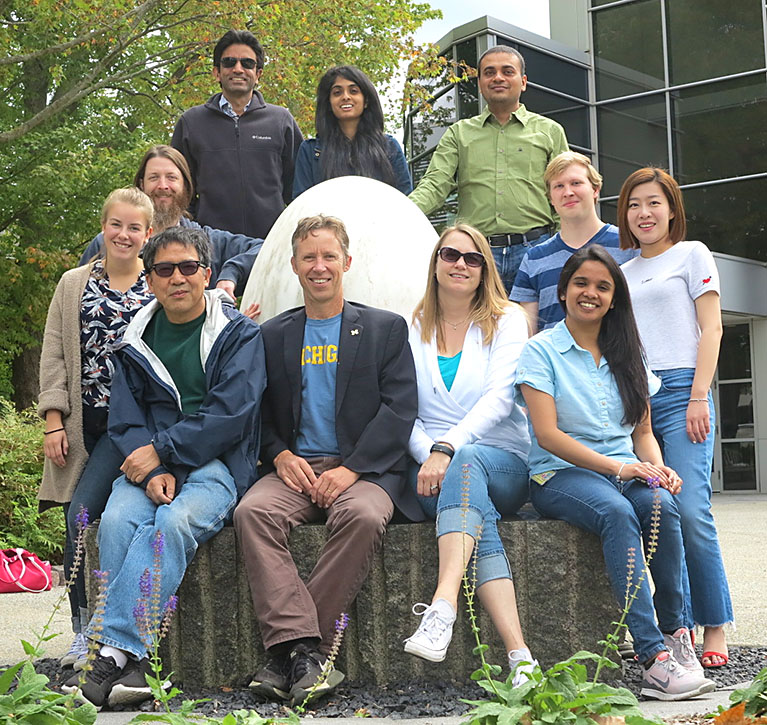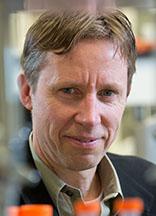
Ljungman lab, Fall 2017: Sitting from left: Huibin Yang, Mats Ljungman, Michelle Paulsen, Radhika Hulbatte, Standing from left: Karoline Krogstad, Brian Magnuson, Karan Bedi, Ishwarya Venkata Narayanan, Saurabh Agarwal, Luke Parks and Siyu Liu
Projects: Winter 2022
ENCODE
Our lab has been a member of and funded by the ENCODE Consortium since 2012. During ENCODE III we were one of the “Technology development groups” developing our nascent RNA Bru-seq techniques and during ENCODE IV we are one of 8 “Mapping Centers” where we are using our Bru-seq technique to profile the transcriptional and post-transcriptional profiles across many cell types as well as assessing co-transcriptional splicing and mapping active enhancer elements genome-wide. This is a very computational focused project working with big data sets across multiple cell lines. One of the projects are exploring the immediate transcriptional response following exposure to ionizing radiation across 16 cell lines, many of them cancer cell lines. This study should yield important novel insights about how cell re-program their transcriptome to respond ionizing radiation and could lead to the identification of new pathways for radiosensitization.
RNA Exosome
In this project we are exploring the quality control mechanisms that cells use to purge the transcriptome of certain RNA species such as enhancer RNA (eRNA) and aberrantly spliced transcripts. The RNA exosome degradation complex is the focus and we are performing studies using cell lines where we can induce rapid degradation of key components of the RNA exosome using auxin. Our hypothesis is that the RNA exosome may be an impactful cancer therapy target. In collaboration with Nouri Neamati and his lab, we have set up a high throughput screening assay and we have screened >80,000 small molecules and are currently performing validation studies of our preliminary positive hits from the screen. The long-term goal is to test the lead compounds for their anti-cancer activities in mouse models and potentially in clinical trials.
Precision targeting of cancer with CRISPER
The innovation of this CRISPR approach is that it targets cancer-specific chromosome rearrangement junctions (CRJ), common to almost all tumors.We have called this approach “Precision KLIPP therapy” and it is based on the use of a “split” enzyme approach consisting of inactivated dCas9 fused to the endonuclease Fok1 (Fok1-dCas9). To activate the Fok1 endonucleases, two Fok1 proteins need to homodimerize; this will occur by using CRJ-targeting guide RNAs to nucleate two Fok1-dCas9 complexes at the CRJ, leading to the specific induction of DNA double strand breaks (DSBs). We have obtained strong proof-of-concept for good efficacy of this approach in cell systems and are now developing lipid nanoparticles to deliver the CRISPR reagents to tumors in vivo. After obtaining in vivo data supporting a tumor inhibiting activity, we intend to set up clinical trials initially for bladder cancer and subsequently for other tumors. The long-term goal is to develop personalized KLIPP Therapy based on whole genome sequence information from patient’s tumors and to rapidly synthesize CRISPR reagents, package them in lipid nanoparticles and provide this medicine to individual patients.
2021 Publications
- Rachel K. Surowiec, Sarah F. Ferris, April Apfelbaum, Carlos Espinoza, Ranjit K. Mehta, Karamoja Monchamp, Karan Bedi, Mats Ljungman, Stefanie Galban: Transcriptomic analysis of Diffuse Intrinsic Pontine Glioma (DIPG) identifies a targetable ALDH-positive subset of highly tumorigenic cancer stem-like cells, Molecular Cancer Research, 19:223-239, 2021.
- Diana van den Heuvel, Cornelia G. Spruijt, Román González-Prieto, Angela Kragten, Michelle T. Paulsen, Di Zhou, Haoyu Wu, Katja Apelt, Yana van der Weegen, Kevin Yang, Madelon Dijk, Lucia Daxinger, Jurgen A. Marteijn, Alfred C.O. Vertegaal, Mats Ljungman, Michiel Vermeulen, and Martijn S. Luijsterburg: A CSB-PAF1C axis restores processive transcription elongation after DNA damage repair, Nature Communications, 12:1342, 2021. PMC7910549
- Soma Samanta, Su Hui Yang, Bikash Debnath, Ding Xue, Yuting Kuang, Kavya Ramkumar, Amy Lee, Mats Ljungman, and Nouri Neamati: YUM70 induces ER stress-mediated apoptosis in pancreatic cancer by inhibiting GRP78, Cancer Research, 81:1883-1895, 2021.
- Yana van der Weegen, Klaas de Lint, Diana van den Heuvel, Yuka Nakazawa, Ishwarya V. Narayanan, Noud Klaassen, Annelotte P. Wondergem,Marta San Martin Alonso, Shivani Rampersad, Yuichiro Hara, Kana Kato, Mayuko Shimada, Sylvie M. Noordermeer, Mats Ljungman, Tomoo Ogi, Rob M.F. Wolthuis, and Martijn S. Luijsterburg: ELOF1 is a transcription-coupled DNA repair factor that promotes DNA damage-induced RNAPII ubiquitylation, Nature Cell Biology, 23:595-607, 2021.
- Déborah Bouvier, Juliette Ferrand, Odile Chevallier, Michelle Paulsen, Mats Ljungman, Sophie E. Polo: Non-canonical function of the histone chaperone HIRA in transcription recovery following DNA damage, Nature Communications, 12:3835, 2021.
- Karan Bedi, Brian Magnuson, Ishwarya Venkata Narayanan, Michelle T. Paulsen, Thomas E. Wilson and Mats Ljungman: Co-transcriptional splicing efficiencies differ within genes and between cell types, RNA, 27:829-840, 2021.
- So Hae Park, Pamela Bennett-Baker, Samreen Ahmed, Martin F. Arlt, Mats Ljungman, Thomas W. Glover, Thomas E. Wilson: Locus-specific transcription silencing at the FHIT gene suppresses replication stress-induced copy number variant formation and associated replication delay, Nucleic Acids Research, 49:7507-7524, 2021.
- Yi, Z., Wei, S., Jin, L., Jeyarajan, S., Yang, J., Gu, Y., Kim, H. S., Schechter, S., Lu, S., Paulsen, M. T., Bedi, K., Narayanan, I. V., Ljungman, M., Crawford, H. C., Pasca di Magliano, M., Ge, K., Dou, Y.Shi, J.: KDM6A Regulates Cell Plasticity and Pancreatic Cancer Progression by Non-Canonical Activin Pathway, Cell Mol Gastroenterol Hepatol., 13:643-667, 2021
Our Team
- Michelle Paulsen – Lab manager
- Huibin Yang – Senior Research Associate
- Ishwarya Venkata Narayanan – Research Associate
- Radhika Suhas Hulbatte – Research Associate
- Brian Magnuson – Bioinformatician
- Karan Bedi – Bioinformaticion
- Ariel McShane – Graduate Student (CMB)
- Victoria Valvo – Graduate Student (Cancer Biology)
- Natalie Gratsch – Research Technician
- Zhijian Yu – Master Student (Bioinformatics)
- Mario Ashaka – Masters Student (Human Genetics)
- Aadi Shiv Malhotra – Undergraduate Student
- Ruchi Garuda – Undergraduate Student
Join Us:
Please contact Mats Ljungman, PhD ([email protected]) if you are interested in working with the Ljungman Lab.

